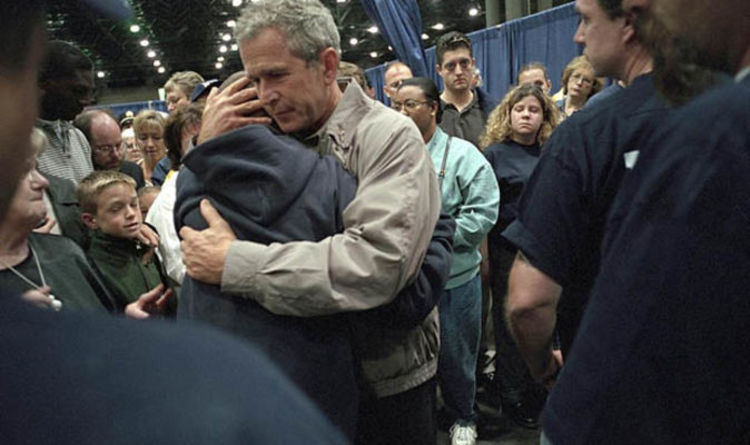I think it’s more important than ever to think about the memory of September 11, 2001. We are in the middle of a pandemic that is the world-changing event of our times, much like 9/11 was.
We need to think about what “Never Forget” means. It’s an important reminder–we should never forget about the events of 9/11. But I don’t think that was ever in doubt. “Never Forget” doesn’t mean “don’t forget about the deadliest attack on American soil since 1941.” Anyone who was sentient that day will remember the events forever, and the people who died that day. Who could forget those images, the anxiety? The friends and family?
Instead, I would argue that to “Never Forget” means to keep in mind the aspects of September 11, 2001 that would fade from our memory, whether quickly or slowly. The things we need reminders for. Here they are.
Above all, it means to never forget the heroism we saw on that day, in the face of certain injury and death. From first responders: firefighters, police, nurses, doctors. From ordinary people. Mothers, fathers, brothers, sisters. Reporters. Restaurant owners. Reflect right now on what they did that day. It’s overwhelming.
It means to never forget the national unity we experienced in the days and weeks after 9/11 (https://www.washingtonpost.com/local/our-brief-moment-of-national-unity-after-the-911-attacks-was-just-that–brief-can-we-ever-get-it-back/2020/09/10/91e93af8-f376-11ea-bc45-e5d48ab44b9f_story.html).
It means to never forget that the shock we felt on that day has a lot to do with our privilege as Americans. Sadly, there are tragedies across the world that we don’t think about twice. Terrorist attacks yes, but mostly genocide, disasters, wars, and health emergencies. But 9/11 was on our soil, and so it hit home, quite literally. We are “disproportionately unaffected” by tragedy as Americans.
It means to never forget that people used those events to demonize entire groups of people. Hate crimes against Muslims, Arabs, Sikhs (!), and other brown people increased in the years following September 11 (https://www.pri.org/stories/2016-09-12/data-hate-crimes-against-muslims-increased-after-911).
It means to never forget that some people didn’t want to believe the story. Remember the YouTube documentary “Loose Change”? “Jet fuel doesn’t melt steel beams”? There have always been people seduced by conspiratorial thinking because they didn’t want to accept the complex, depressing, seemingly senseless reality of the situation.
It means to never forget that people can be complicated… Whatever you think of George W. Bush, he was exceptional as a leader in the days and weeks following the 9/11 attacks. He was reassuring, he actively called for people to respect Muslims, and he focused on the people that mattered in those days and weeks. (https://qz.com/1074258/911-video-and-text-of-george-w-bushs-islam-and-peace-speech/)
…and some people aren’t complicated at all. In the moments after the attacks on the World Trade Center, Donald Trump bragged that he now owned the tallest building in New York (not true), claimed he was sending people to help with the recovery efforts (he didn’t), and filed for and received a loan meant to go to small businesses in Manhattan. These are all forms of dishonesty, in one of the most troubling moments in our nation’s history, that help himself and no one else. (https://www.washingtonpost.com/history/2019/09/11/what-was-trump-actually-doing-an-anniversary-fact-check/)
So what does this mean for 2020?
Well, the coronavirus pandemic mirrors 9/11 in many ways, but I just want to point out a few things:
In both events, we had our moments of national unity. Remember March 2020? There was a time when we all felt like we were in this together. And in some ways that’s still true, but in many ways it’s not.
In both events, leadership made puzzling decisions that fractured the country. It took some time for the U.S. to start the war in Iraq. But it only took a month before Trump was actively pitting citizens against each other, state leadership, and health officials. Bush’s decision fractured the country as a byproduct; Trump makes explicit attempts to split communities. This would be like if George W. Bush gave a speech on September 29, 2001 and said something like: your Muslim neighbor is so glad this happened! And in fact, that’s essentially what Trump did following 9/11 (https://www.politifact.com/factchecks/2015/nov/22/donald-trump/fact-checking-trumps-claim-thousands-new-jersey-ch/).
In both events, misinformation decreased national unity. We can run through all the conspiracy theories about both events. But the thing that really sticks out about the coronavirus pandemic is that the conspiracy theories move so quickly through social media that they are much more dangerous.
And so here’s what I ask that we “Never Forget” on September 11, 2020:
We still have heroes. Everyone appreciates firefighters. But do we appreciate police who will run into the rubble, or in 2020, deal face to face with belligerent people who won’t wear masks? Do you appreciate the epidemiologists and immunologists who are shunning their families, working around the clock to understand this disease and find treatments so that we can get close to normal sooner? They are our heroes right now, whether people trust them or not.
We need steady leadership. This means electing leaders who will reassure us in the midst of tragedies. Leaders who will ask us to pull together as a country. Leaders who will not act like the tragedy isn’t real. Leaders who will keep their eyes on the prize and not get distracted. Leaders who won’t reject intelligence. Leaders who will better prepare so these kinds of things don’t happen again.
We are in this together. Fighting a pandemic takes effort from everyone. And it’s a long slog but we’ll make it through quicker if we can do this all together.
